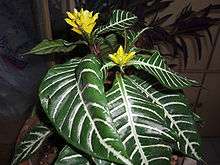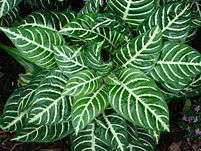Aphelandra squarrosa
- "Zebra Plant" redirects here. This can also refer to the Marantaceae Calathea zebrina.
| Zebra Plant | |
|---|---|
 | |
| Scientific classification | |
| Kingdom: | Plantae |
| (unranked): | Angiosperms |
| (unranked): | Eudicots |
| (unranked): | Asterids |
| Order: | Lamiales |
| Family: | Acanthaceae |
| Genus: | Aphelandra |
| Species: | A. squarrosa |
| Binomial name | |
| Aphelandra squarrosa Nees | |
Aphelandra squarrosa (commonly but ambiguously called "zebra plant") is a plant species in the family Acanthaceae, which is native to Atlantic Forest vegetation of Brazil. This plant is often used as a house plant. This plant is cited in Flora Brasiliensis by Carl Friedrich Philipp von Martius.
Plant Care

This plant likes lots of light, but not direct. It does not bloom often, but it can be encouraged to bloom by prolonged daily exposure to light. It is also very sensitive to moisture content; too much or too little water will cause the lower leaves to brown and fall off. It likes to be kept moist but not wet. On average needs small amounts of water often rather than a thorough watering once in a while.
The plant flourishes when the temperature is in the range of 18-21 °C (65-70 °F); and will suffer if the temperature drops below 15 °C (60 °F) for a prolonged period.
Biological Activity
Dichloromethane and methanol extracts of Aphelandra squarrosa of family Acanthaceae were screened for cytotoxic and phytotoxic activity.Cytotoxicity was evaluated by using 'Brine-shrimp Lethality Assay' and Phytotoxicity was determined by using 'Lemna bioassay for phytotoxicity'. Dichloromethane crude extract exhibited highly cytotoxic activity with LD50 0.6903μg/ml. The methanol extract showed significant activity in phytotoxic bioassay while dichloromethane extract showed good activity that assures the possible potential of cytotoxic activity as well as phytotoxic activity of extracts of aerial parts of Aphelandra squarrosa of family Acanthaceae.[1]
See also
References
- ↑ Asif Javaid Awan,Muhammad Shahzad Aslam,Chaudhary Bashir Ahmed, Muhammad Uzair,Indian Research Journal of Pharmacy and Science; 1(3);(2014) 75-79
External links
- Michigan State University Extension: Aphelandra squarrosa
- (Portuguese) Flora Brasiliensis: Aphelandra squarrosa